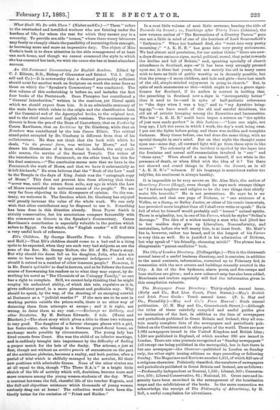An Old-Testament Commentary for English Readers. Edited by C. J.
Ellicott, D.D., Bishop of Gloucester and Bristol. Vol. I. (Cas- sell and Co.)—It is noteworthy that a demand presumably sufficient should exist for another work on Scripture on mach the same lines as those on which the "Speaker's Commentary" was conducted. The first volume of this undertaking is before us, and includes the first four books of the Pentateuch. Dean Plumptre has contributed a 4` General Introduction," written in the cautions, yet liberal spirit which we should expect from him. It is an admirable summary of the main facts which relate to the origin and the elassification both of the Canonical and of the Apocryphal books, to the original text, and to the chief ancient and English versions. The commentary on --fienesis is from the pen of the Dean of Canterbury, that on Exodus by Canon Rawlinson, that on Leviticus by Dr. Ginsburg, while that on Numbers was contributed by the late Canon Elliott. The critical stand-point occupied by Dr. Ginsburg is different from that of his -collaborateurs. He does not think that the book with which he deals, "in its present form, was -written by Moses," and he draws his illustrations of it from what is, indeed, the only avail- able source, the service of the Second Temple. The writer of the introduction to the Pentateuch, on the other hand, has this for
• his final sentence,—" The conclusion seems sure that we have in the Pentateuch the work of Moses, and that we have it substantially as it left his hands." He even believes that the "Book of the Law "read -in the Temple in the days of King Josiah was the "autograph copy of Moses." This does not prevent him from allowing that there "never was, until the return from exile, any age in which the Law of Moses commanded the universal assent of the people." We are very far from objecting to this divergende of opinion. On the con- trary, we welcome it. The freedom which Dr. Ginsburg has enjoyed will greatly increase the value of the whole work. We can only wish that other contributors may be disposed to use it. Something has been done in this direction already. Dean Payne Smith is atrictly conservative, but his annotations compare favourably with the comments on Genesis in the Speaker's Commentary. Canon • Itawlinson's contribution is espeoially valuable in the portion which • refers to Egypt. On the whole, the "English reader" will find this very useful book of reference.














































 Previous page
Previous page